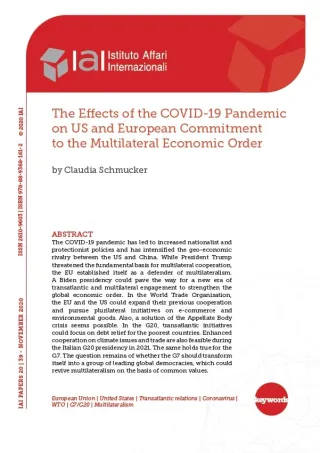Titolo completo
The Effects of the COVID-19 Pandemic on US and European Commitment to the Multilateral Economic Order
The COVID-19 pandemic has led to increased nationalist and protectionist policies and has intensified the geo-economic rivalry between the US and China. While President Trump threatened the fundamental basis for multilateral cooperation, the EU established itself as a defender of multilateralism. A Biden presidency could pave the way for a new era of transatlantic and multilateral engagement to strengthen the global economic order. In the World Trade Organisation, the EU and the US could expand their previous cooperation and pursue plurilateral initiatives on e-commerce and environmental goods. Also, a solution of the Appellate Body crisis seems possible. In the G20, transatlantic initiatives could focus on debt relief for the poorest countries. Enhanced cooperation on climate issues and trade are also feasible during the Italian G20 presidency in 2021. The same holds true for the G7. The question remains of whether the G7 should transform itself into a group of leading global democracies, which could revive multilateralism on the basis of common values.
Paper presented in a joint webinar on transatlantic relations by the Istituto Affari Internazionali (IAI) and the Deutsche Gesellschaft für Auswärtige Politik (DGAP), organised in cooperation with the Italian Ministry of Foreign Affairs and International Cooperation, the Compagnia di San Paolo, the Friedrich Ebert Stiftung (Rome Office) and the US Embassy to Italy on 5 November 2020.
1. The lack of global economic cooperation during the COVID-19 crisis
2. Transatlantic relations in crisis – But too important (and big) to fail
3. European and transatlantic approaches to multilateral economic cooperation during and after the COVID-19 pandemic
3.1 US and European approaches to the WTO
3.1.1 New WTO initiatives to fight the pandemic
3.1.2 EU (and US) commitment to WTO reform
3.2 G20: Global and transatlantic initiatives
3.3 Transformation of the G7 to a larger group of global democracies
Conclusion
References


